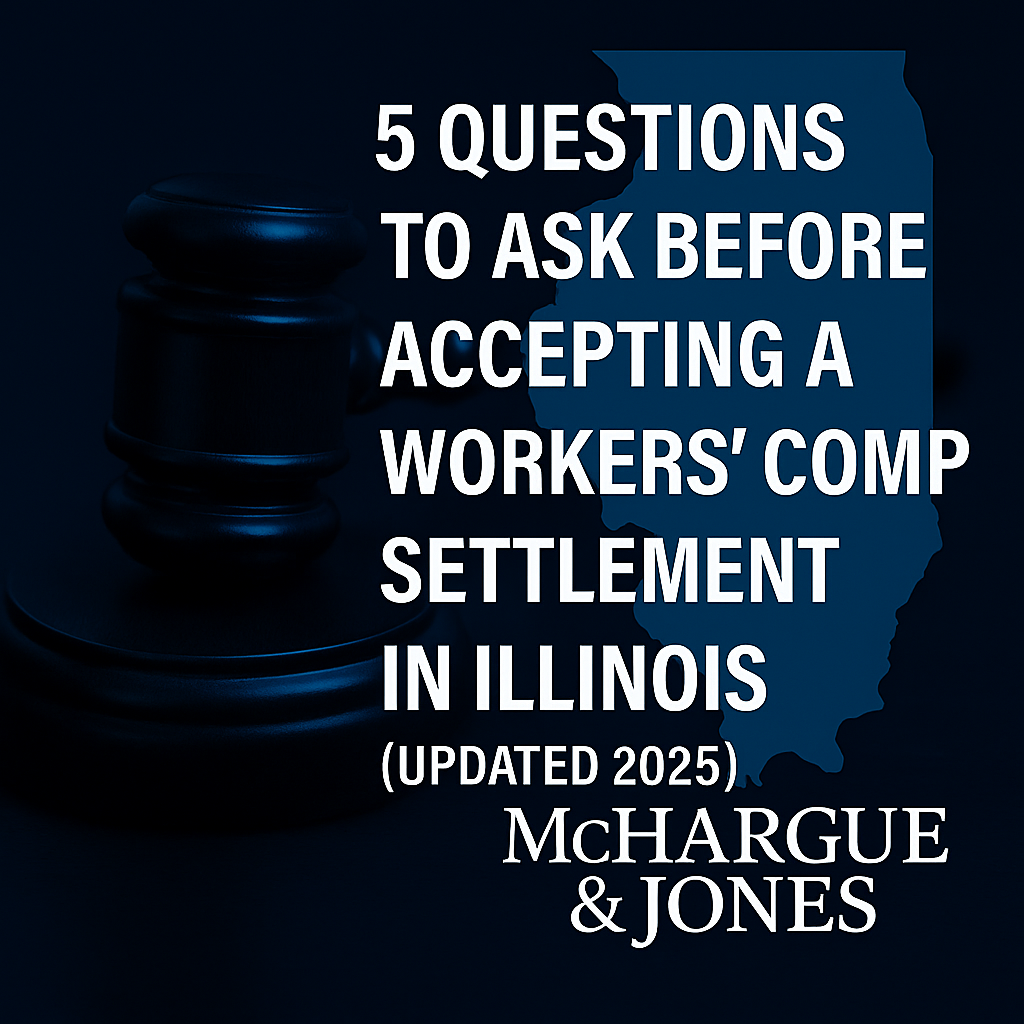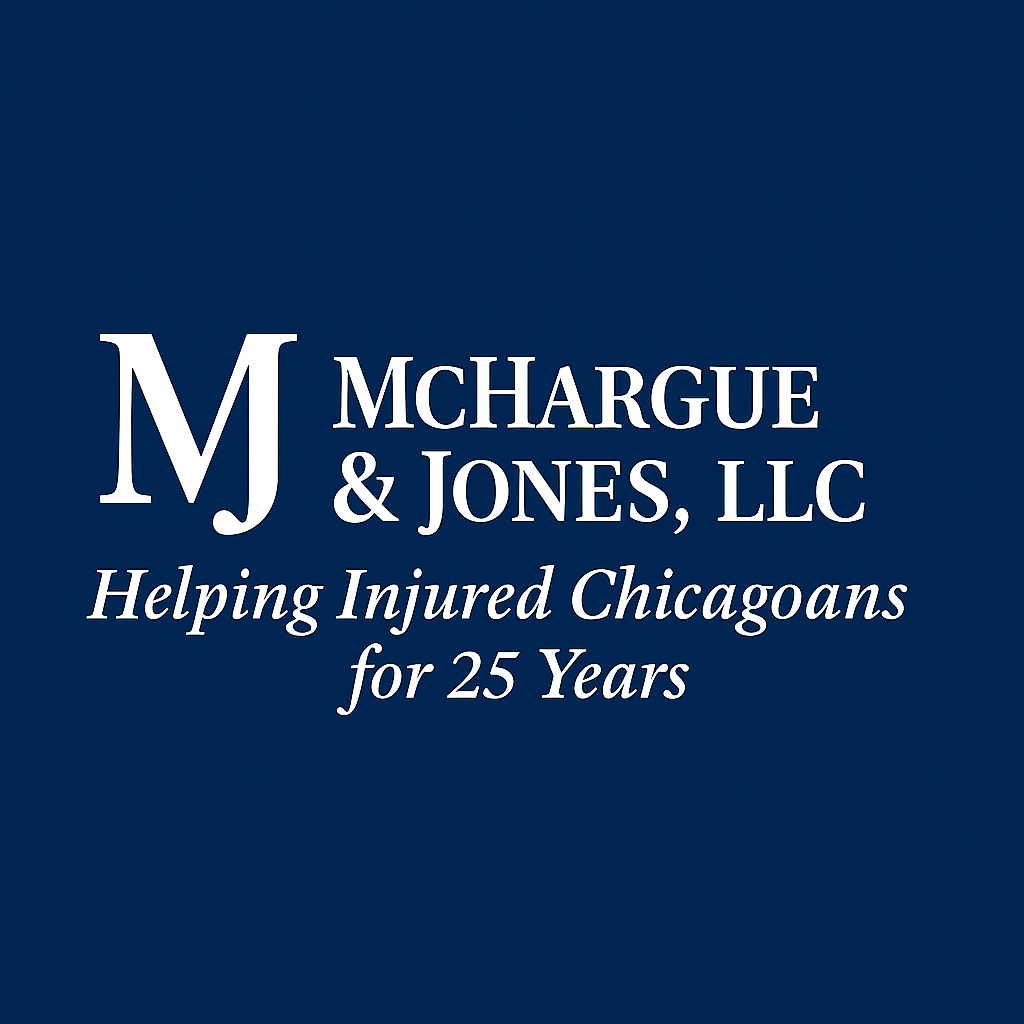5 Questions to Ask Before Accepting a Workers’ Comp Settlement in Illinois (Updated 2025)
Being offered a workers’ compensation settlement can feel like the light at the end of a long tunnel. After weeks or months of doctor visits, paperwork, and uncertainty, the idea of finally getting a check is tempting. But before you sign, pause.
Insurance companies often make low initial offers hoping you’ll accept less than you truly deserve. A rushed decision can leave you without coverage for future medical bills, lost wages, or lasting injuries. The smartest move? Talk to your attorney and ask these five critical questions before accepting any Illinois workers’ compensation settlement. A few minutes of caution now can protect years of financial security later.
 Don’t Rush Your Workers’ Compensation Settlement
Don’t Rush Your Workers’ Compensation Settlement
After months of pain, appointments, and missed paychecks, a workers’ comp settlement can feel like the finish line. But insurance companies often open with low offers hoping you’ll sign quickly. Before you agree to anything, make sure the number actually covers (where applicable) future medical care, lost wages, and any permanent limitations. A short conversation now can protect years of financial security later.
1) Should I Settle My Workers’ Comp Case or Keep It Open?
Settling gives you certainty (and a check). Keeping your case open can preserve ongoing medical and wage benefits while you finish treatment. If your condition isn’t stable or your doctor anticipates more care, talk to a lawyer before closing out future rights—once you sign and the arbitrator approves it, your case is final.
2) How Is My Settlement Value Calculated in Illinois?
The Illinois Workers Compensation Act looks at your average weekly wage (AWW), the body part affected, and the extent of permanent impairment. The core math uses a number of weeks assigned by law × 60% of AWW (subject to state min/max). Factors that can increase value include future surgery, permanent restrictions, or job loss/transition.
Plain-English example: If your AWW is $1,200, your base PPD rate is ~$720/week (60%). If your impairment is valued at 10% loss of your body as a whole, it would be 10 x 5 = 50 weeks, 50 × $720 ≈ $36,000 (before any other components). Your true case may be higher or lower depending on facts. Check out this chart for specifics.
If you have a back injury with surgery and return to your usual job without restrictions, for example, the case would likely settle for 10% to 30% loss of your body as a whole. That same injury, however, would be potentially worth a very different range of values if you have permanent restrictions and cannot return to your former job.
Injured at Work in Chicago?
Get your free Illinois workers’ comp case review. You don’t pay unless we win.
Click Here to Start Your Free Case Review
Or tap to call (312) 739-0000.
3) How Long Until I’m Paid?
Most Illinois settlements are funded 30–60 days after arbitrator approval. Delays happen when insurers drag their feet or there are unresolved medical liens. We track deadlines and escalate quickly if payment stalls.
4) Can I Negotiate for More?
Nearly always. Initial offers are frequently below fair value. We compare your case to similar Illinois outcomes, make sure every category of loss is counted, and push the defense for increases—sometimes in multiple rounds—until the number matches your real needs.
5) Does a Judge/Arbitrator Need to Approve My Settlement?
Yes. Illinois workers’ comp settlements must be approved by an arbitrator at the Illinois Workers’ Compensation Commission. Approval is normally routine when the paperwork is correct and the terms are fair—another reason to have counsel draft and submit it.
New: Some People Start Without a Lawyer—Here’s the Honest Truth
You can (but I wouldn’t recommend it) manage parts of an Illinois workers’ comp claim yourself, especially when:
-
Your doctor and the insurance doctor agree,
-
TTD checks are on time, and
-
Care is approved without a fight.
But when it comes to the final settlement, it’s highly unlikely in our experience that the adjuster or their lawyer will pay what your case is truly worth without your own lawyer in your corner. We frequently meet people holding a lowball offer; after we’re retained, we use our experience, leverage, and reputation as fighters to obtain substantial increases. This isn’t magic—it’s the product of knowing the law, the numbers, the arbitrators, and how to pressure carriers.
New: Settlement Types & Strategies That Change Your Result
Not all settlements are the same. We evaluate the right path and assemble the right experts to maximize value for your specific facts.
Common Illinois settlement/value paths include:
-
PPD (Permanent Partial Disability): The most common. Based on the affected body part, impairment, and your wage rate.
-
Wage Differential: If permanent restrictions force you into a lower-paying job, this can be worth far more than standard PPD.
-
PTD (Permanent Total Disability): For injuries that prevent any gainful employment. Often lifetime-level benefits.
-
Loss of Trade/Occupation: Where permanent limits prevent you from returning to your prior line of work (even if some work remains possible).
-
Disfigurement / Scarring: Separate weeks may apply for visible, permanent scarring on eligible body areas.
-
Medical Buyouts / Future Care: Strategically negotiated when future treatment is expected—must be valued and documented correctly.
How we maximize the outcome:
-
Medical strategy: Coordinate with treating specialists; obtain persuasive narratives and impairment opinions; challenge adverse IMEs.
-
Vocational experts: Show how restrictions reduce your employability and earning capacity; crucial for wage differential or loss of occupation.
-
Functional testing (FCE): Objective documentation of permanent limits.
-
Life-care planning / cost projections: Quantify future treatment, equipment, or home modifications when appropriate.
-
Economic analysis: Calculate lifetime wage loss, fringe benefits, and inflation-adjusted projections where relevant.
-
Claims leverage: Deadlines, motion practice, and trial readiness move numbers when carriers stall.
Choosing between PPD vs. wage differential vs. PTD (or combining theories where allowed) can mean the difference between a modest settlement and a life-changing recovery. That strategy is case-specific—this is where we earn our keep.
When to Talk to a Lawyer
Before you sign anything, get a quick, no-pressure review. At McHargue & Jones, LLC, we’ve represented Illinois workers for 25+ years and routinely turn low initial offers into markedly better results through careful analysis and tough negotiation.
📞 (312) 739-0000 — Free, confidential consultation.
Hablamos español. No fee unless we recover for you.
Frequently Asked Questions
Can I handle my workers’ comp case without a lawyer?
Sometimes—especially while treatment is smooth. But at settlement, most unrepresented workers are underpaid. Having counsel usually raises the final number.
How do I know if my offer is too low?
Compare it to your wage rate, impairment, work restrictions, and potential wage-differential/PTD exposure. We’ll run the numbers for free.
How fast do I get paid after approval?
Typically 30–60 days post-approval, barring unusual issues.
Can my settlement include future surgery or therapy?
Yes—if it’s negotiated properly and supported by medical evidence.
What if the insurer is stalling?
We escalate, set hearings, and use Commission procedures to enforce timelines and payment.


